For successful business owners and aspiring entrepreneurs, recognising the significance of a well-defined business marketing plan outline is crucial for achieving long-term success.
At the heart of a marketing plan marketing strategy lies the art of strategic thinking to help define marketing plan objectives. It’s a roadmap for the future that outlines your company’s SEO marketing plan, guiding you towards effective strategies and different marketing strategies to generate leads, boost revenue, and accomplish your marketing objectives.

By delving into market research, you’ll uncover crucial insights about consumer behavior, market trends, and the competitive landscape for your marketing plan. Armed with this information, you can craft messages that truly connect with your audience, helping you make smart decisions along the way.
One key benefit of a marketing plan is its ability to keep you focused and on track. You can efficiently allocate your resources and efforts like professional marketers by defining your target market, selecting the most appropriate marketing channels, and crafting compelling campaigns.
Keeping an eye on your marketing strategies regularly helps you track success, spot where improvements are needed, and tweak your plans accordingly. It’s all about staying agile and making sure your efforts are hitting the mark.
With a well-structured marketing strategy plan, you’ll have a solid foundation to drive your business forward, stay ahead of the competition, and follow us.
This high-level guide will delve into the essential elements of a document that outlines a marketing plan presentation, illuminating how it can effectively propel your business towards accomplishing its sales and customer acquisition objectives!
Want to receive updates? Sign up to our newsletter
Each time a new blog is posted, you’ll receive a notification, it’s really that simple.
What Is a Marketing Plan?
A marketing plan incorporating a market development strategy to generate increased leads and revenue is imperative to strategically guide a company’s marketing endeavours.
This can be achieved through various means, including conducting focus groups to gain valuable insights.
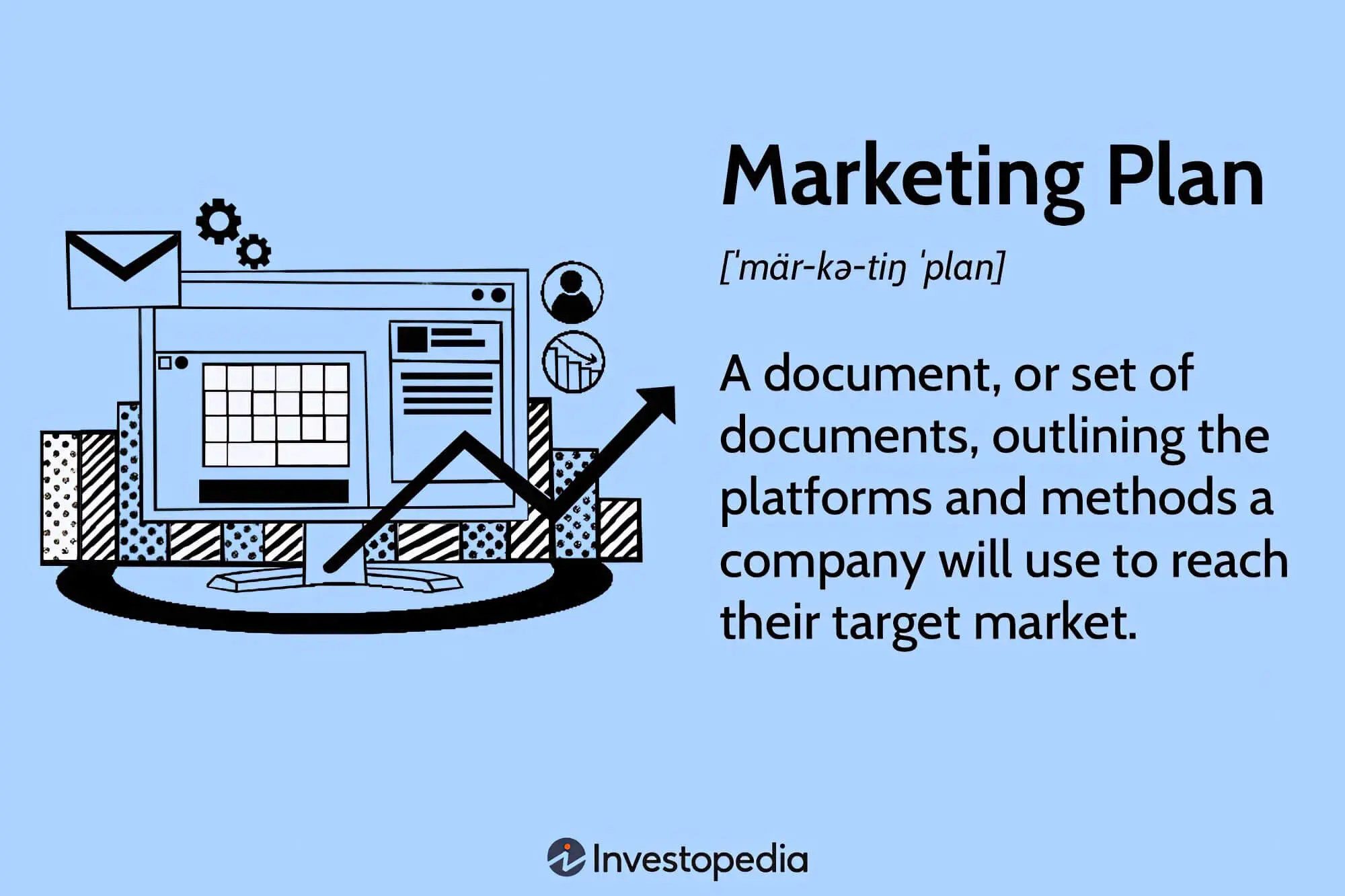
It begins with thorough market research, uncovering market trends and consumer preferences to help you determine the most effective price structure and messaging.
Tailored to a specific demographic and geographic area, your messaging will resonate deeply with your target audience, capturing their attention and driving them towards action through a well-executed social media campaign considering product price.
With research and messaging established, the next step is selecting the appropriate platforms to bring your campaigns to life. While SEO marketing strategies are vital in the digital landscape, it is equally important to consider other avenues, including the Internet, radio, and trade magazines, during the marketing audit process.
With a diverse mix of platforms, your marketing plan becomes a well-rounded strategy that reaches your audience wherever they are.
But the work doesn’t stop there. A vital feature of a marketing plan is its metric system, which allows you to analyse the performance of your campaigns. This valuable feedback helps you identify successful initiatives, manage cost per campaign, and learn from any shortcomings. As the industry evolves and consumer demands shift, your marketing plan should be a living, breathing document that adapts and grows alongside your business.
A solid marketing business plan might cover everything from your company’s goals and mission statement to its vision, values, brand awareness, marketing budget, and key strategies.
Incorporating all these elements creates a cohesive and powerful tool that aligns your marketing efforts with your overall business objectives. Let’s look at these in more detail through dedicated blog posts!
Marketing Plan Vs Marketing Strategy
Many folks mix up marketing plans and strategies because they’re so intertwined in the marketing world. But, it’s crucial to tease apart their differences and really understand what each one brings to the table.
These terms can sometimes be consolidated into a unified document, especially in smaller companies with fewer major campaigns throughout the year.
An integral part of a marketing plan involves employing a top-down marketing strategy that outlines targeted marketing activities to be executed over specific time frames, such as monthly, quarterly, or annual. On the other hand, it also incorporates a bottom-up marketing strategy that outlines the overarching value proposition underlying these activities.
This means putting together a comprehensive approach to reach your target audience, nail down your brand positioning, and build a marketing plan that mirrors your long-term goals and growth.
Businesses can ensure clarity and coherence in their marketing efforts by differentiating between a marketing plan and a marketing strategy. While the plan offers a granular roadmap of tactics and timelines, the strategy provides the guiding principles and objectives that align with the organisation’s vision.
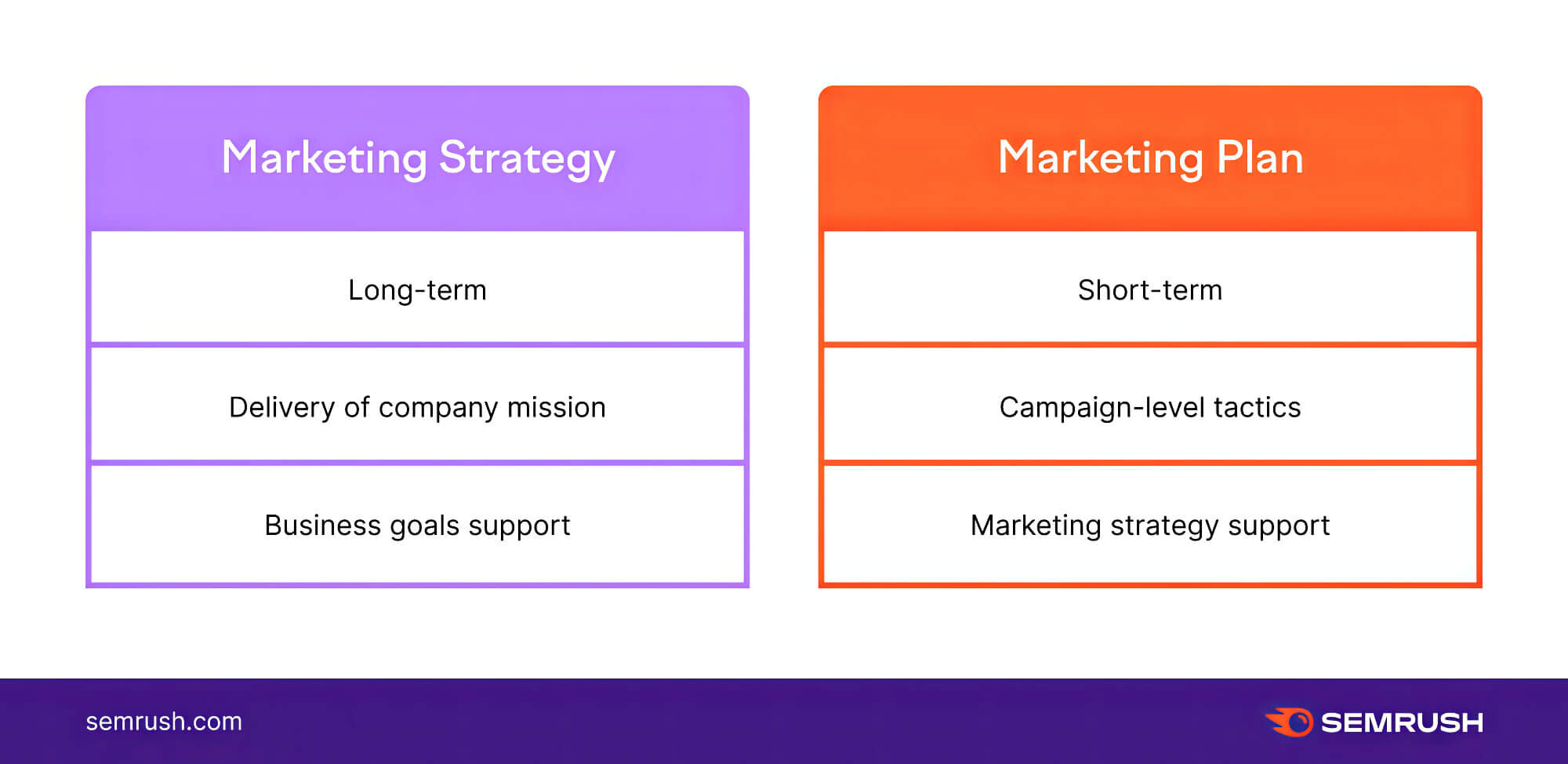
Benefits Of A Marketing Plan
Regardless of your company size, a marketing plan can be beneficial in attracting and acquiring new customers and boosting sales. This customer service marketing plan document turns your goals into a tangible, measurable format and evaluates the company’s overall performance.
There are several benefits to having a marketing plan, and these include:
1. Sets Direction
A detailed marketing market plan strategy can define your business’s focus and marketing objectives. It also provides direction since it is a blueprint for attaining goals and setting strategies. This will also eliminate potential problems and help you generate leads, increase sales, and attract customers who follow and reach organisational objectives.
2. Efficient Resource Management
A marketing plan, which includes various strategic elements, enables efficient resource management. As a result, the company gains valuable insights into optimising its operations for optimal functionality.
But if there is a detailed outline of what needs to be done, it prevents any potential mistakes or confusion as part of your marketing plan.
An entire marketing plan also comprises the marketing budget needed for various business aspects. A transparent marketing budget allocation minimises additional expenses for human or marketing resources.
3. Consistency Among Departments
A well-structured marketing plan lets your marketing team focus on their assigned tasks without being distracted by shifting priorities. This will help them meet the business’s requirements without being overwhelmed by the amount of information or challenges thrown at them.
Consistency is a critical factor for a brand’s image and goodwill. Your customers should be able to expect professionalism, so when there is a marketing plan, it enables your team to provide messages across various channels consistently. As a result, customers’ trust builds and creates a positive image and good reputation for the company.
4. Identifying The Target Audience
A marketing plan prompts you to research the market and develop a buyer persona. With this approach, you’ll better understand your target customer base. This has to be done before creating a marketing plan, after which this information can be used to develop the company’s marketing strategy based on consumer expectations, preferences, etc.
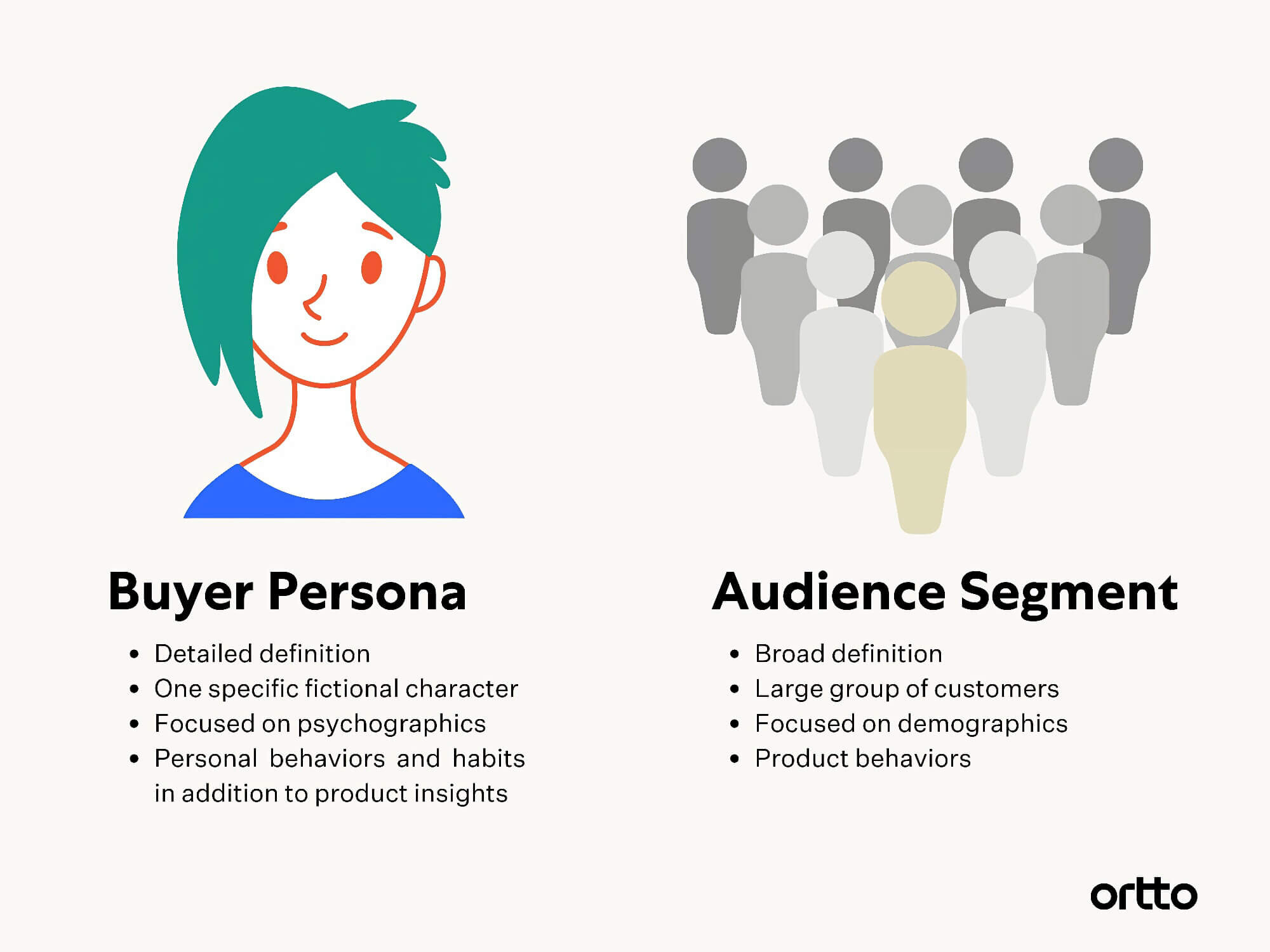
5. Competitor Analysis
Conducting a study on competitors is necessary for the development of every marketing plan. Competitor analysis helps identify what is popular on the market to create a product with unique features.
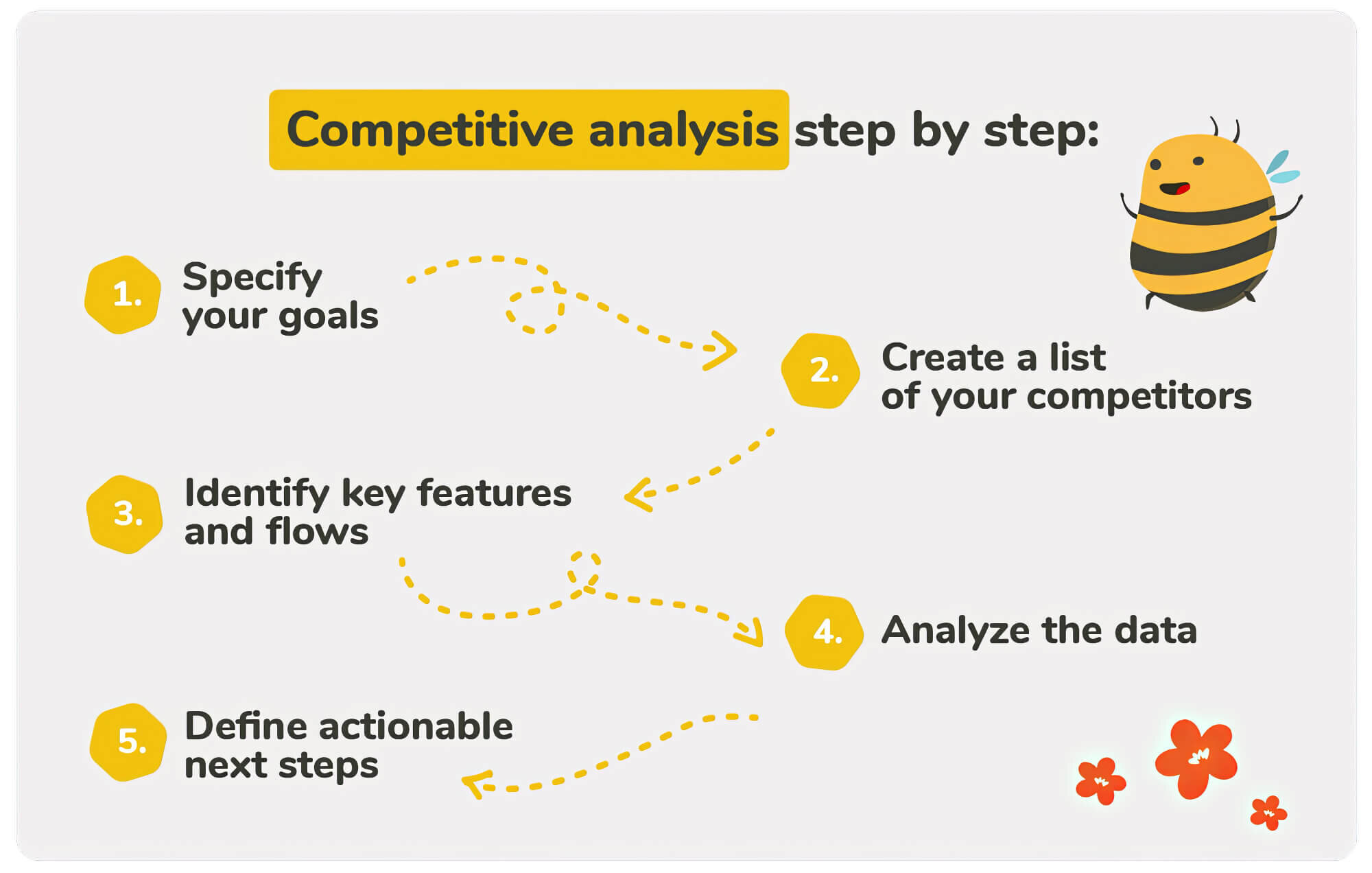
Additionally, a SWOT analysis will identify opportunities and potential threats. So, a marketing plan ensures you know your competitor’s strengths, uniqueness, features, pricing, and customer reviews. This information can then be used to improve your product and efficiently address key components of a marketing strategy.
6. Improves Clarity For The Business
Staying informed about the latest marketing trends, including the elements of product price place, is crucial for companies to operate smoothly, effectively achieve their goals, and understand the most effective strategies. When there is a clear strategy and detailed plan, a company and its team members have better clarity on the objectives and tasks.
Employees can be more aware of their roles and responsibilities, contributing to achieving key targets. When the employees know what they are meant to do in a company, they can help improve the overall performance of their marketing department and marketing programme to achieve what they want to achieve.
Types Of Marketing Plans
Marketing strategies or marketing plans come in different forms based on the business needs and how the company functions. There are three popular types of marketing strategies:
1. New Product Launch
This marketing plan focuses on how a company can introduce a new product. It also contains information regarding potential customers and how the product can be advertised to increase its sales. This could include detailed customer profiles.
Most new product launch plans have detailed campaigns that can help push the product into the mainstream market and enhance its popularity. Creating a marketing plan in business for a new product enables the company to:
- Validate a product
- Write strategic objectives
- Identify your target market
- Compile a competitive list
- Develop a value proposition for a new product or service
- Consider service and sales of the new product in the plan
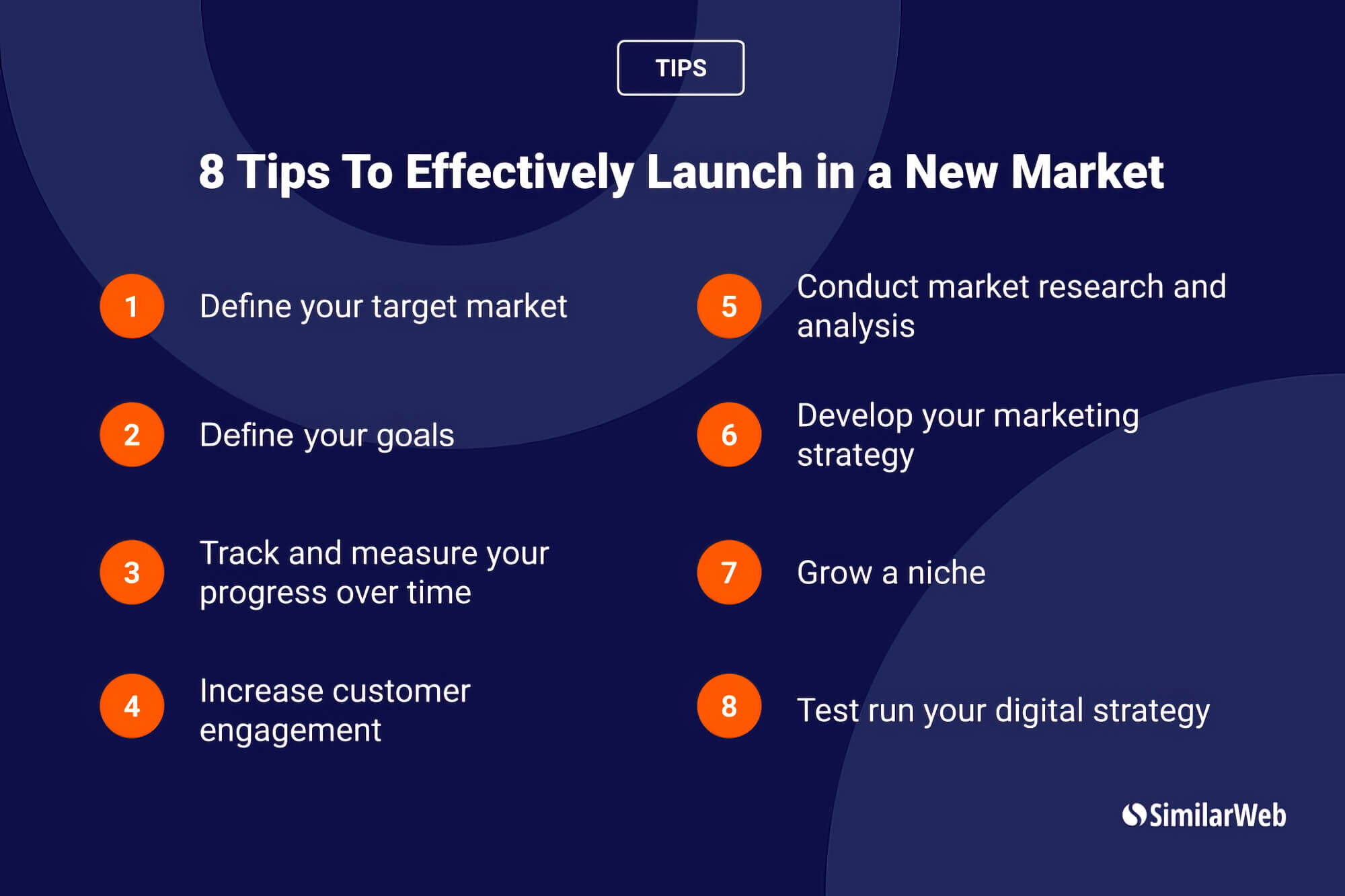
2. Social Media
A social media marketing plan outlines the advertising strategies explicitly used per the marketing plan definition for major social media platforms. This plan also mentions various ways a company can engage with users through various marketing strategies on social platforms.
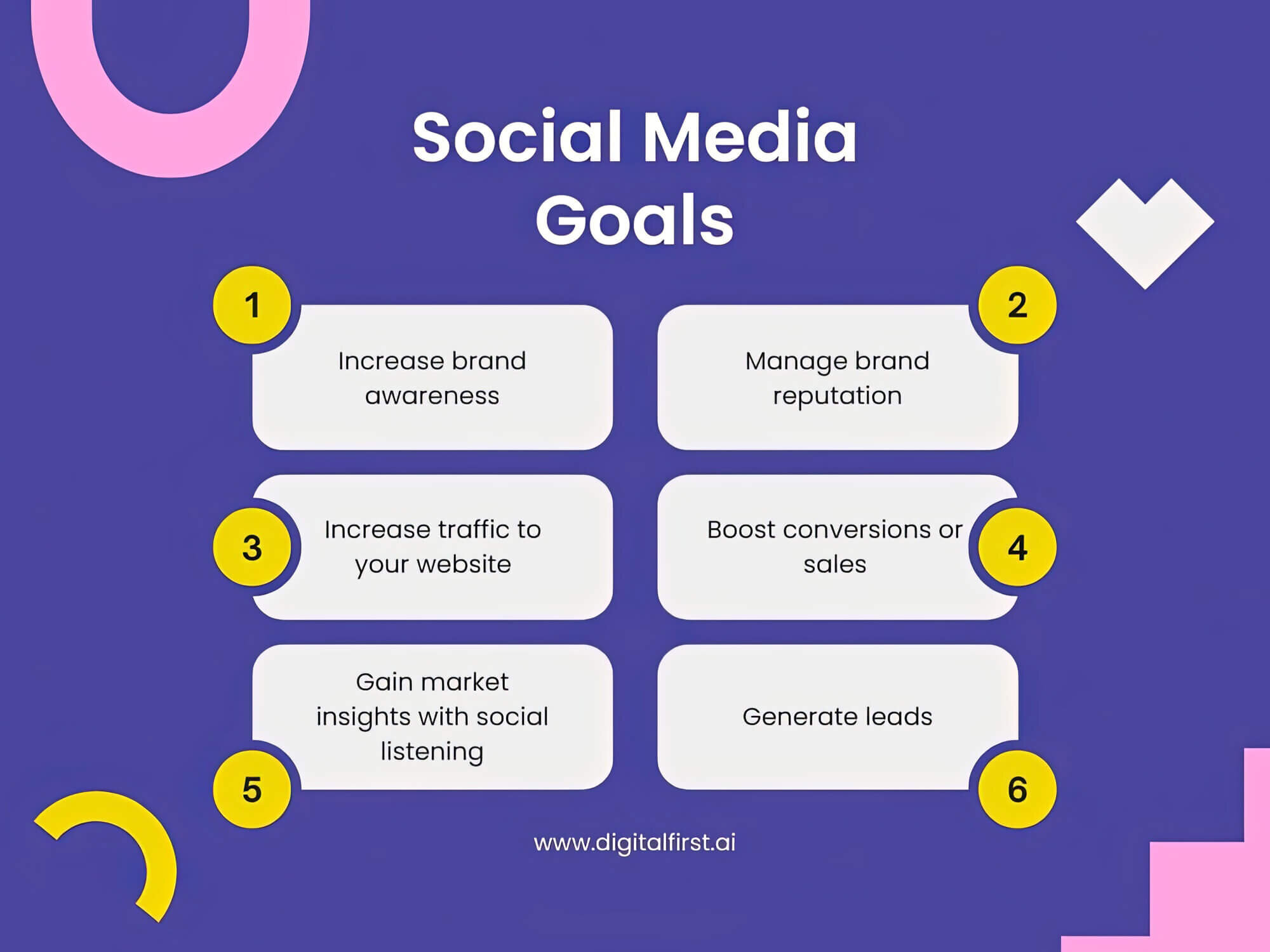
A successful book launch requires a good marketing plan, which is an example of social media marketing. It involves using data to optimise your marketing strategy and increase public awareness about the book.
This, in turn, results in more people subscribing to your content and eventually converts these subscribers into potential buyers. These buyers can then be promoted to recommend your book to their families and peers.
Writer Shane Snow used these marketing tactics to promote his latest book, “Dream Team”. Taking the data-driven content strategy into consideration, Shane chose the content strategy waterfall. A content strategy waterfall is a marketing plan model used to develop a system with a linear and sequential approach.
3. Time-based
Whether implemented quarterly or annually, time-based marketing strategies concentrate on the annual marketing plan’s specific periods within a given year.
The annual marketing plan outlines a comprehensive overview of the current market conditions and offers insights into the most effective marketing strategies to employ during that specific timeframe.
For those looking to develop a marketing plan, Forbes recently released a highly acclaimed marketing plan template that garnered positive reviews. This template, designed for time-based plans, encompasses 15 crucial sections.
- Executive summary
- Target customer base
- Unique selling proposition
- pricing and brand positioning strategies for your products or services
- Distribution plan
- Company offers
- Marketing materials
- Promotions strategy
- Online marketing strategy
- Conversion strategy
- Joint ventures and partnerships
- Referral strategy
- Strategy for increasing transaction prices
- Financial projections
How To Write A Marketing Plan
Creating a well-rounded marketing plan requires strategic and accurate execution. Here are some valuable tips to guide you in developing your marketing plan:
1. Mission And Value Proposition
A marketing plan takes into account a company’s value proposition. A value proposition is the total value promised to be delivered to the customer and usually appears on the company website or other branding pages.
The value proposition should ideally mention how your company addresses the customer’s problems. It should also include the benefits of the product you’re selling, the brand and why customers should choose this company, not your competitors.
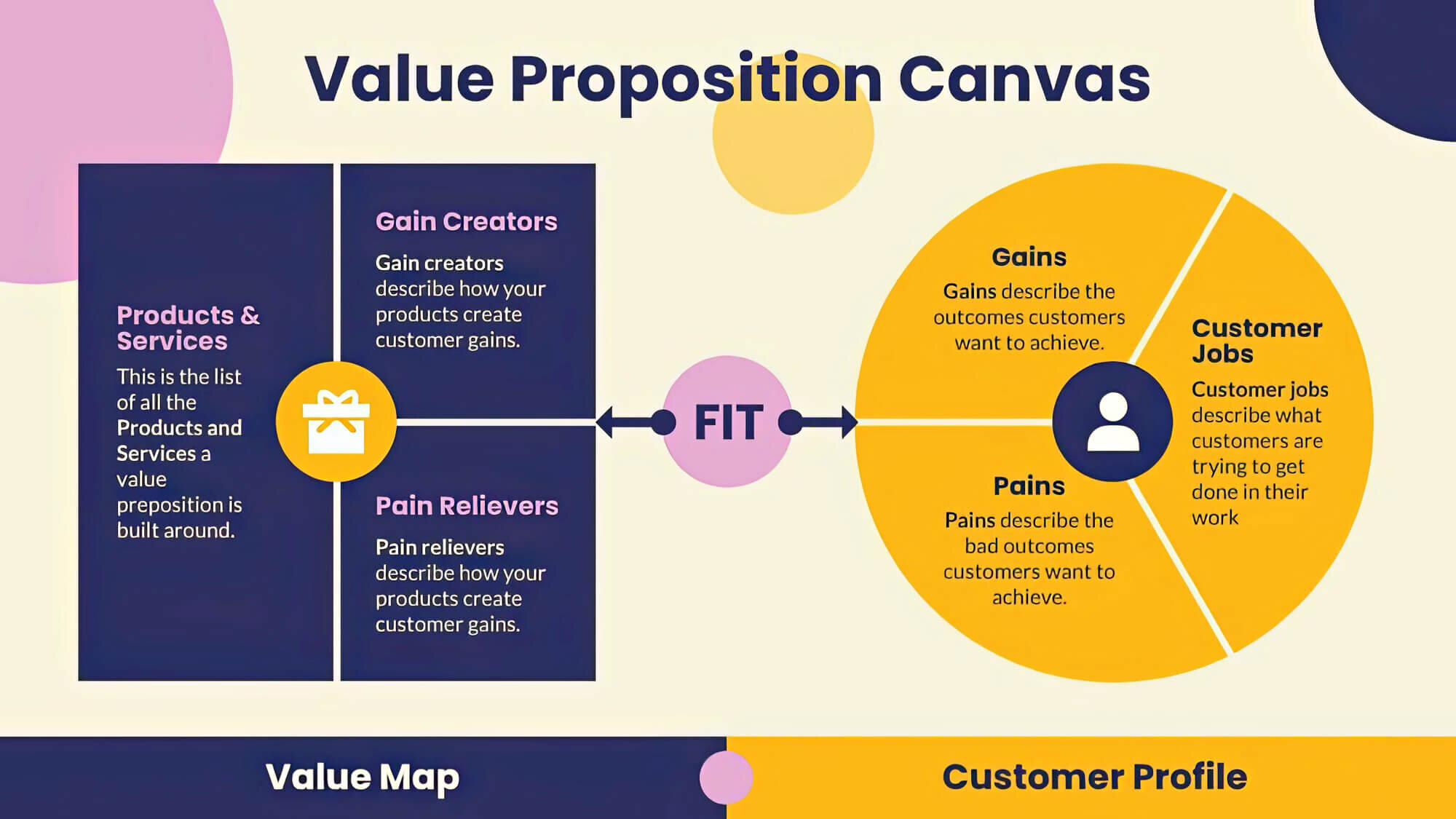
2. Set KPIs
KPIs or key performance indicators allow the company to assess the success of a particular marketing plan concerning its value proposition.
For instance, if your company aims to tap into a specific demographic in a particular region, you can track the company’s website visits and social media engagement through key performance indicators KPIs.
According to 2020 market research, the most effective techniques for digital marketing are content marketing and marketing automation.
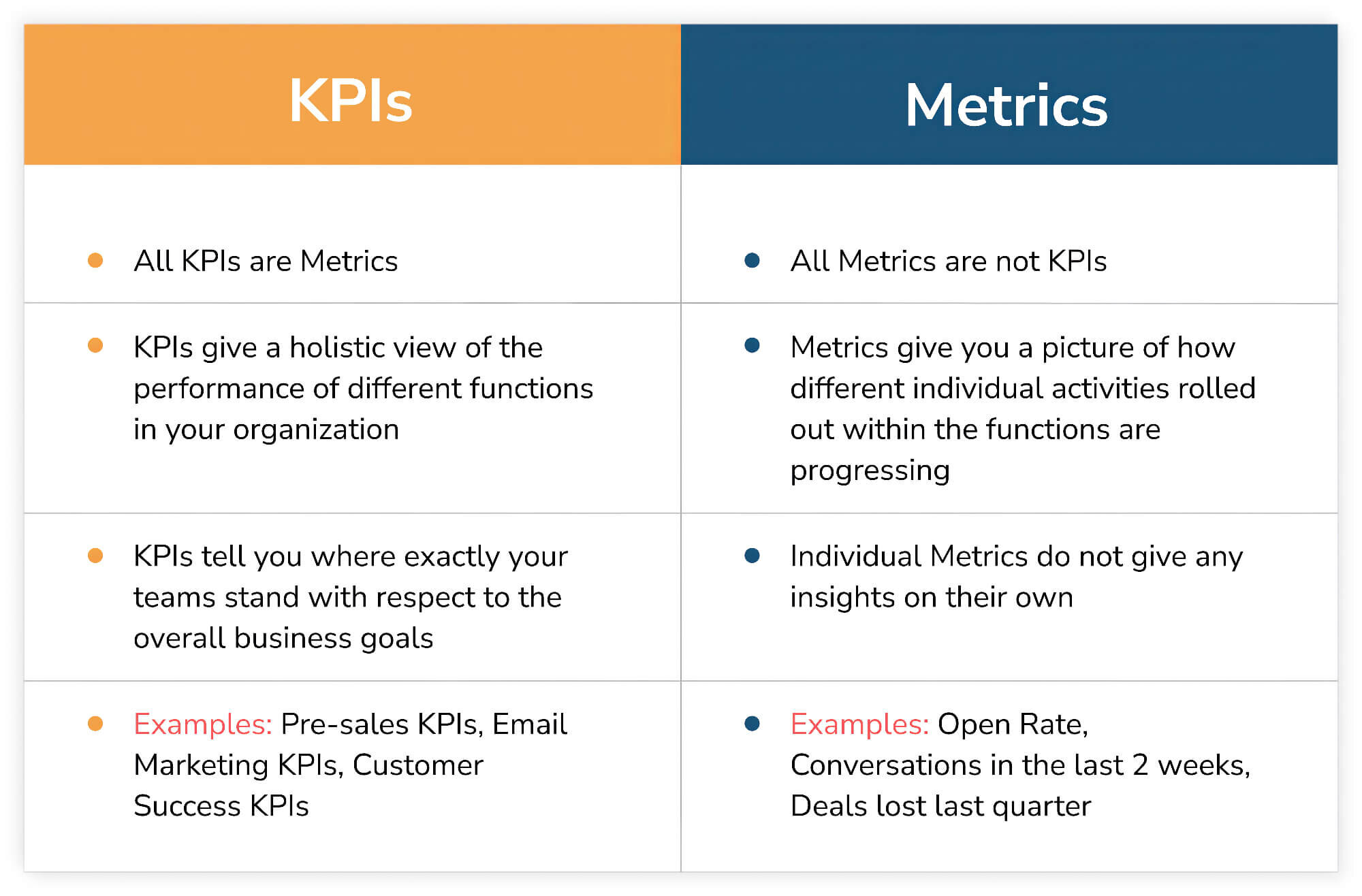
3. Identify Target Market
Your marketing plan should identify the target market for a specific product or the brand as a whole. Usually, market research provides a basis for a target market and marketing channel decisions.
Proper market research allows a company to develop an idea of its target audience. This will enable them to better understand and plan an advertising channel accordingly. For instance, the company can run its ads on radio, television, social media, online ads, or other digital platforms to share its message.
Knowing who you want to sell the product/service to and why are key components of all business plans. This allows you to cater your business to those who need it and can pave the way for its success despite various demographics having different needs and tastes.
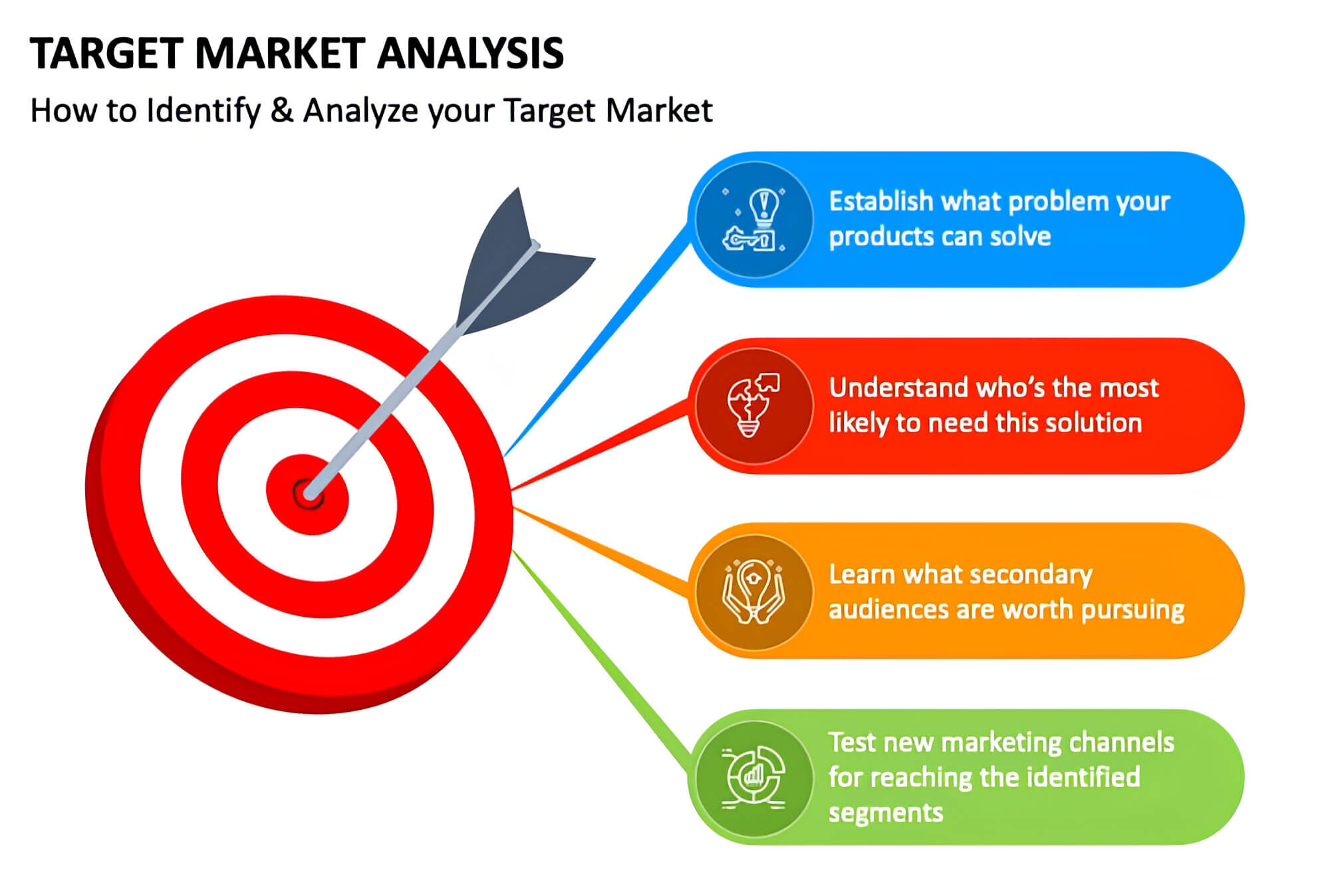
4. Strategy And Execution
An advertising strategy is a crucial component of a marketing plan, providing the rationale behind various business decisions. Ideally, your marketing plan should detail the timing, creation, and placement of particular PR campaigns and include metrics that can accurately measure their effectiveness.
For instance, which marketing strategy would best suit your products and services, such as social media or radio advertising? Similarly, when can it be executed and which hour would be the peak time for airing the advertisement?
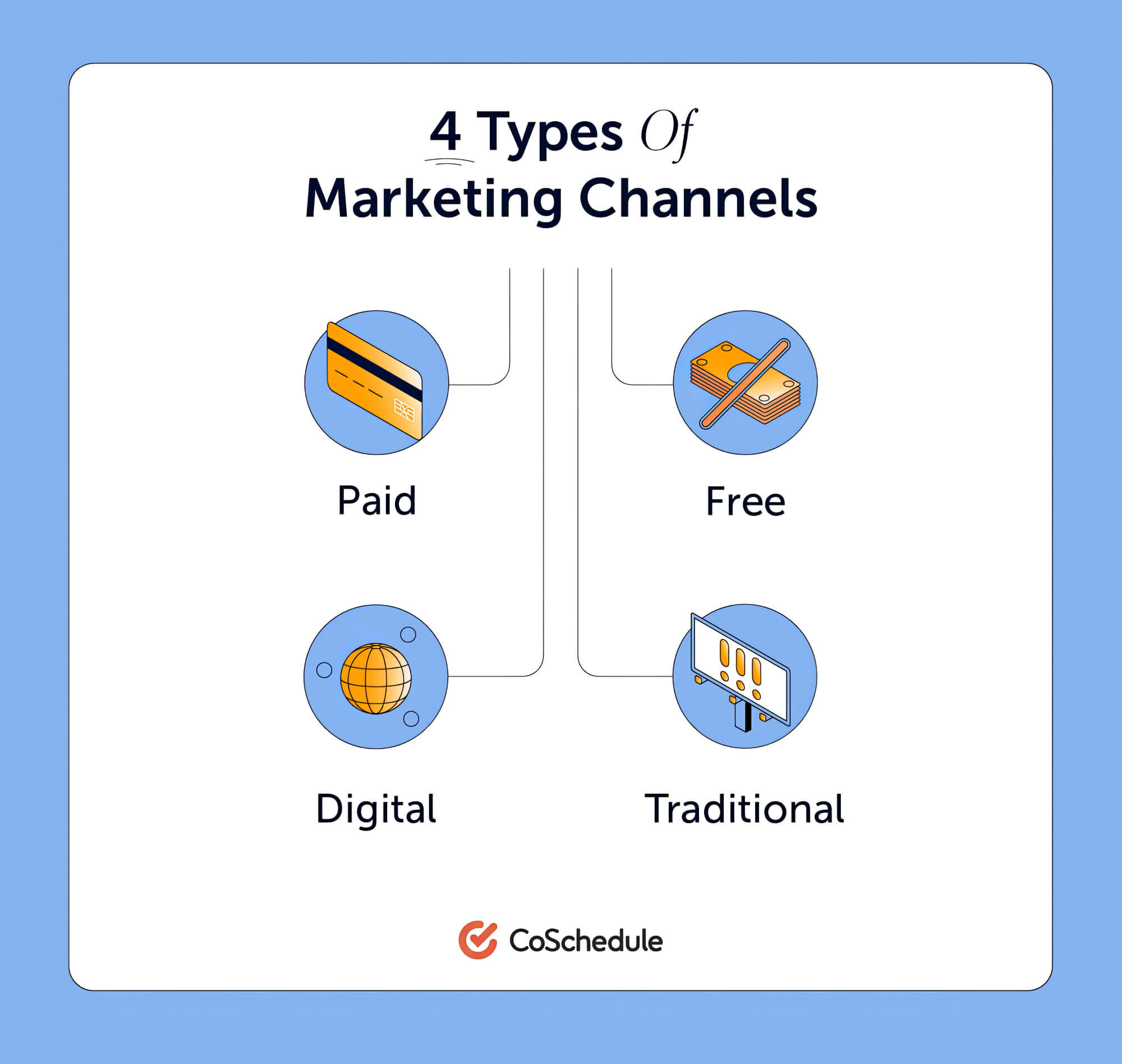
5. Set A Marketing Budget
When crafting a marketing plan, it is essential to establish a clear understanding of your budget and allocate resources wisely. This practice ensures the development of a sustainable budget plan, preventing expenses from surpassing generated income.
In addition to preventing runaway costs, a well-thought-out budget plan can help you distribute money to various parts of your marketing plan.
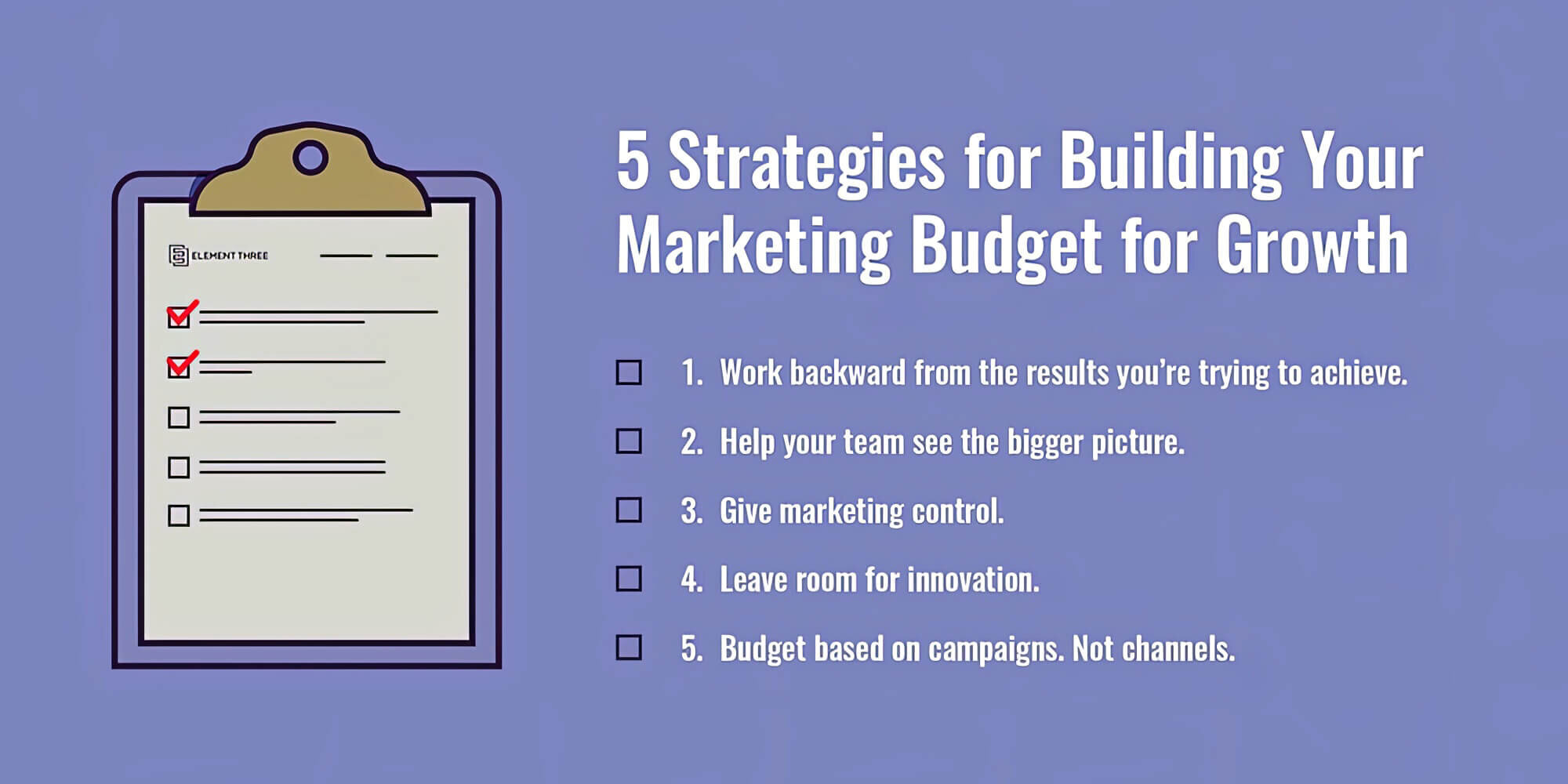
6. Adjust The Plan
Your marketing plan can be adjusted at any point, depending on the results from the metrics. For example, if digital ads perform far better than conventional advertising, the budget of the digital marketing campaigns can be revised to afford a better-performing platform.
This allows your marketing plan to remain optimised throughout its course as a business’s marketing plan and prevents unnecessary spending on campaigns that don’t yield the required results.
As a content marketing manager, your main challenge is ensuring that each platform the marketing campaign runs on has sufficient time to deliver results. For instance, digital ads show faster results than traditional television ads, so giving both these platforms the same amount of time to produce results can be impractical.
Additionally, your company must use the right metrics to assess the performance data. Failing to do so can result in a lack of clarity regarding the campaigns’ performance, leading to the company repeating and dropping various campaigns.
Apart from being time-consuming, this can lead to unnecessary marketing costs and inaccurate advertising results.
These are the main factors that help create a successful marketing plan and strategy. In a traditional marketing mix, a marketing plan falls under the category of promotion, which is also one of the four Ps of marketing.
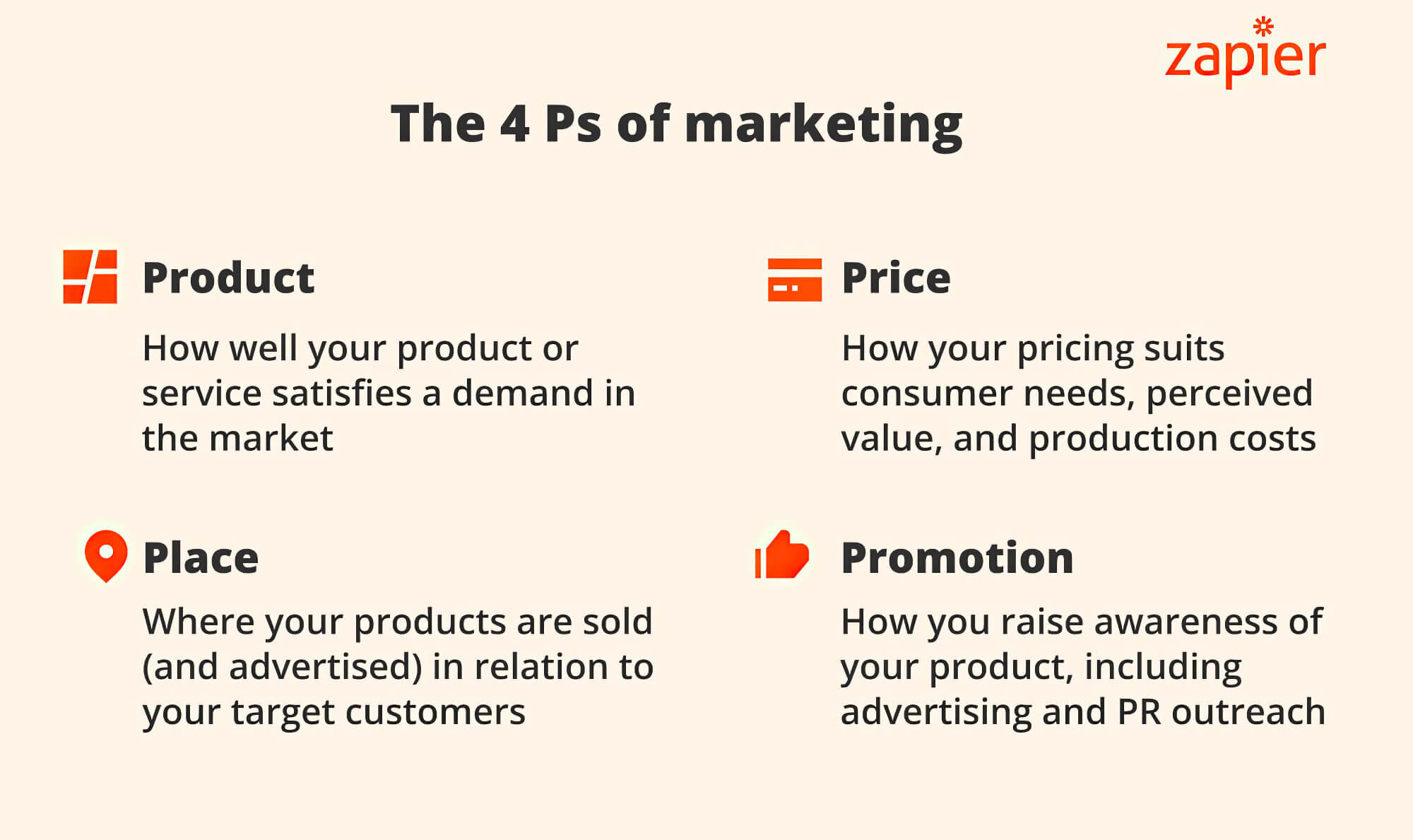
Example Of A Marketing Plan
John came up with a new business idea that he believed to be a niche in the industry. He turns this idea into a functioning business and begins with a business plan that details his company’s marketing objectives, values, goals, threats, and the company’s value proposition.
With the help of his friends and family, John raised enough funds to get started and outlined a comprehensive table of contents for his marketing plan. He hired several employees and ordered the resources needed to make his product. He wanted to start selling the finished product and generate revenue to keep his business going.
For this, John began to develop a comprehensive marketing plan and obtained the help of a marketing agency. The marketing plan consisted of market research that focused on the target market specifically for John’s product, which turned out to be recently retired men.
Once the target market was established, John and his entire team moved on to how to reach it. After extensive research, the marketing plan concluded that the best place to reach John’s target market would be radio and television instead of social media. This is because John’s target audience is senior men who frequently use traditional media instead of modern platforms.
The company then created ads catering to the target market and showcased how John’s products would benefit them, especially compared to other alternatives. Once the marketing plan was implemented, the marketing team in John’s company analysed the metrics and translated them into sales.
Unveiling The Power Of A Dynamic Marketing Plan
A marketing marketing plan is crucial for initiating your company’s marketing endeavours. However, it’s essential to recognise that relying solely on a single plan is not sustainable.
Your marketing plan must be continuously refined and adapted to evolving customer feedback, market dynamics, and expectations to thrive in the long run.
By embracing a mindset of agility and flexibility, you can ensure that your marketing efforts remain effective and aligned with your business goals. Regularly assess and update your plan to incorporate valuable insights, address emerging opportunities, and enhance customer experience. Remember, a well-crafted and meticulously executed marketing plan is the key to achieving your desired outcomes.
Fostering collaboration across all teams is vital, particularly when developing a marketing plan for a start-up. Engage in open communication and collaborative brainstorming sessions to ensure everyone understands their roles and responsibilities and understands why it’s important to create one cohesive marketing strategy.
If you are still trying to figure out where to start, look at free marketing plan templates and your competitors’ marketing activities.
The journey to marketing success lies in continuously refining your marketing plan, embracing adaptability, and fostering collaboration. By remaining attentive to market changes and involving your teams throughout the process, you can position your business for sustained growth and achieve remarkable results in today’s dynamic business landscape.
Want to take your marketing efforts to new heights? Start refining your marketing plan, optimising your strategies, and achieving remarkable results today with sitecentre®. From web design and SEO to content marketing, we can help create a marketing plan that will see you achieve real results. Call us on 1300 755 306 to learn how today!
Frequently Asked Questions
1. What is the difference between marketing and business plans?
A business plan focuses on how a business operates. For more details, refer to the marketing plan FAQs. A business plan operates in every aspect and can also be called the roadmap for a business.
Generally, a business strategy comprises the company’s goals, mission, vision, and finances, incorporating a marketing plan into the business’s daily business plan. These factors are also used to optimise the day-to-day operation of the business and achieve its objectives.
Such a plan is an executive summary, a description of the product or service sold, marketing strategies, financial planning, and the overall budget. A business plan will usually include a marketing plan, which focuses on the marketing and advertising aspects of the business.
It also details ways to attract customers’ attention to the product or service and raise public awareness. A marketing plan allows the business to reach potential target markets and generate higher sales.
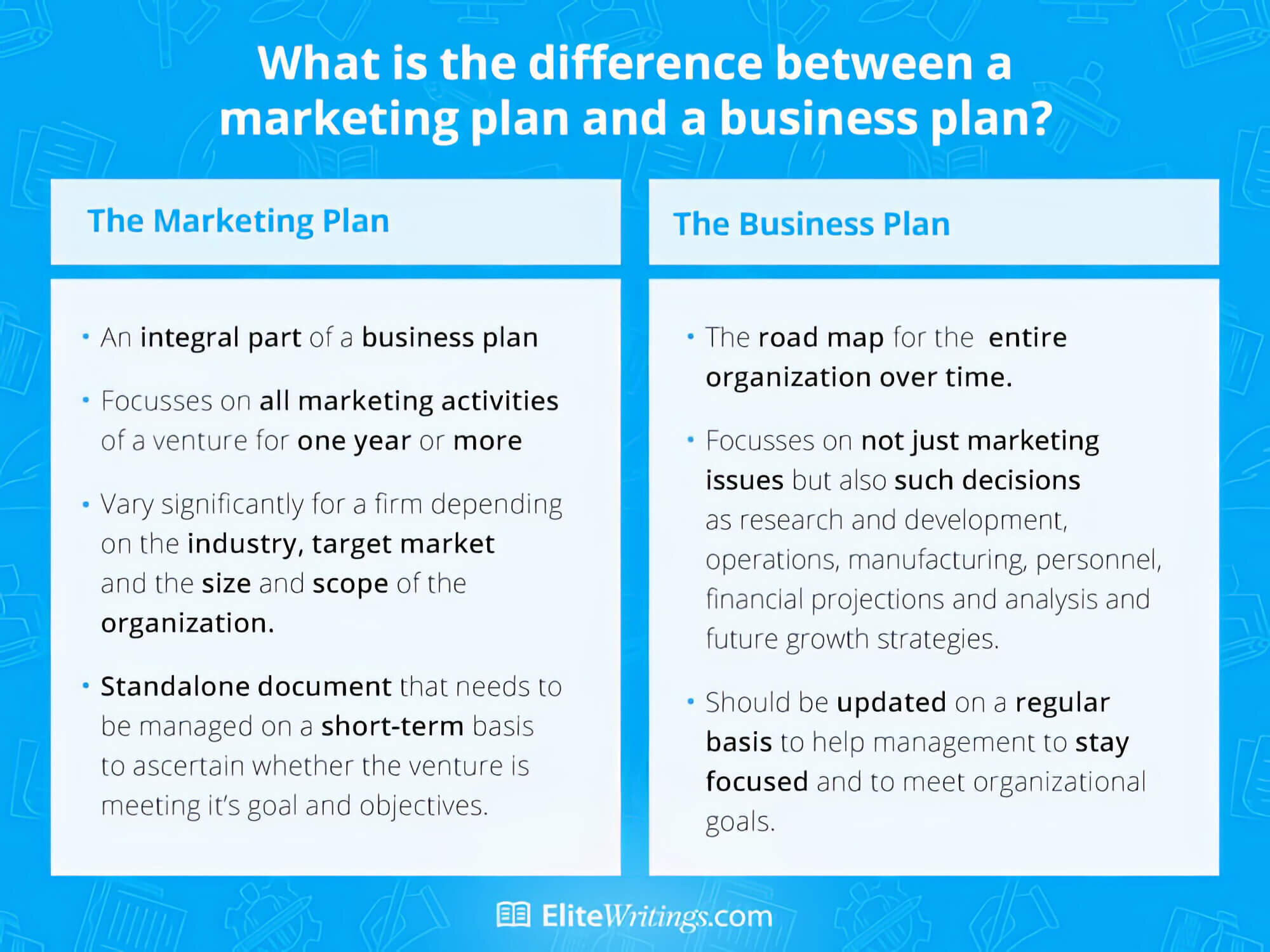
2. What is a marketing plan template?
A marketing plan template is a document a business owner can use to create a detailed marketing plan. This template usually comprises all the essential aspects of a marketing plan and includes several language options with blank sections that can be customised.
With the help of the marketing plan template, the entrepreneur can insert their company’s information and specifications to create a marketing strategy personalised for the brand ultimately. A marketing plan is a well-thought-out and structured document that can be pretty complicated for many to grasp. However, the marketing plan template provides people, especially newcomers, an easy yet effective way to draft their marketing plan.
3. What is a marketing plan for small businesses
Small businesses marketing plans differ from traditional marketing plans because small companies have limited resources for campaigns and marketing. Contrary to the traditional marketing plan of 15 plus steps, a small business plan comprises six or fewer steps. These include:
- Assessing current business conditions
- Determining the ability to invest
- Outlining marketing goals
- Identifying target audience
- Determining market tactics
- creating a marketing plan company with task prioritisation
In addition to these factors, two main factors that you must consider before developing a marketing plan for service-based businesses are:
A. Budgeting
Once you’ve analysed the current business situation, knowing how much you can invest in the marketing plan for a small business on a budget is essential. Since marketing costs money, setting a realistic amount aside for creating a successful marketing plan can be beneficial.
Various sources offer different marketing plan templates for smaller businesses on a budget. These can help you better understand how much you should allocate for the project and calculate its return on investment.
B. Goals
The ideal marketing goal should be SMART, which stands for specific, measurable, attainable, relevant, and time-bound. Keeping these factors in mind can help you set realistic goals for your business that you will have a higher chance of achieving.





